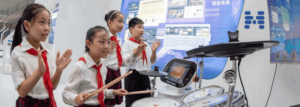
KUALA LUMPUR, 12.8.2021 – The COVID-19 pandemic has forced many to undergo the shift to remote learning for both students and schools. At one point, technology proved to be useful opportunities for virtual learning to continue classes despite being confined to our homes.
However, as online learning started to become the norm, student cheating has seen a rise as well.
From April to August 2020, a study from Imperial College London found an increase of nearly 200% in the questions and answers that were posted on a student learning platform, Chegg, Inc. Known as a student-first learning platform, it was found that Chegg’s homework help section was up over 196% from the same period in 2019.
The study concluded that the increase in student cheating correlated to the shift to online learning and misuse of educational tools like Chegg.
Another report by Texas A&M University stated that they found more than 800 cases of academic fraud after a faculty member noticed that students were finishing complex tests in less than a minute. Some of the information were coming from Chegg, a university representative said. In a separate case, Boston University also reported several students using the site to cheat.
While websites like Chegg aren’t designed for cheating, they do offer a platform for it.

When asked about cheating, many students mentioned that they were just looking to pass the course, and only intended to do so in the short term. They also cited difficulties in online education that affected their ability to retain information, such as asking questions during class. Students can ask questions through email, but miss the ease of a direct explanation they have from raising a hand in class.
Andrew Labit, a freshman from the University of Missouri, stated that he has been struggling to learn in this new environment.
“Unlike in-person classes where you have to show your work and actually learn something, online is just to “get to the answer,” he said. “That’s where a lot of our mentality went to, just trying to get the right answer.”
To combat cheating, many education institutions have taken to using a proctoring system to monitor student activity in an exam. Students are asked to show their identification and workspace while their audio and video are recorded. The program can also track eye movement during exams and prevent users from opening new tabs.
However, even with a camera on the other side, students still find ways to cheat around the system. Some place a phone on their desk after the workplace check, while others write notes on their arms. These aren’t an obvious problem when students don’t have to show their work.
Although student cheating is a bigger problem than ever, universities still maintain their integrity as an educational institution to hold students accountable to their actions, whether they admit it or not.
A representative from McGill University, Canada, said in an email statement that some students have already faced disciplinary action for plagiarism and cheating. Students that are suspected of misconduct are summoned for a disciplinary interview. Based on the evidence gathered, they can either face probation, a grade penalty, or a failing grade for the entire course.
For many, it is not that COVID-19 has increased cheating, but rather that students are getting caught easier, as stated by Tricia Bertram Gallant, the director of academic affairs at University of California, San Diego.
“Cheating is cheating,” she added. “It hasn’t really changed in a hundred years. People have always cheated by going to sources that they weren’t supposed to go to.”

Tee May
Teemay is a content writer who relishes telling a good story as much as she enjoys reading one. A fan of fantasy and time travel lore, she indulges herself with quaint daydreams of living in a vintage cottage settled deep in the woods. She hopes to achieve this one day, or may just settle with a treehouse instead. In her free time, she practices amateur astrology and interprets birth charts. These started out as a hobby for ‘fun’, but they come close to being obsessions these days.





